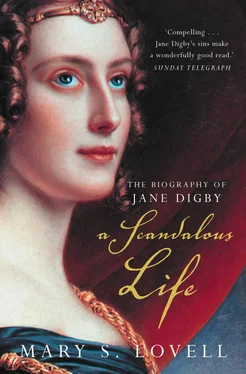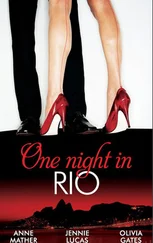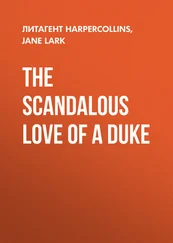1 ...6 7 8 10 11 12 ...27 The appearance of serenity was, however, a front. The eighteen-year-old Jane, still more child than woman, left more and more in her own company, was inexorably sucked into the glittering and sophisticated world of the European diplomatic set, to whom she had first been proudly introduced as Ellenborough’s fiancée. They were Edward’s friends and now they were hers too. She was intelligent enough to see that their rules on behaviour were not those of her own family, but it seemed to her that if these highly regarded people behaved in such a manner then she too could play by their rules. Her husband’s infidelity may have caused the new note of defiance in her conduct.
Jane’s activities were remarked by friends of the family, who were concerned that the young woman should be given a hint in order to correct any danger of being thought ‘fast’. Predictably, when her parents remonstrated with her, Jane defended herself vigorously, provoking an estrangement with her father which lasted some months. 14 Steely spoke to her and, receiving no satisfactory response, took the matter up with Lady Anson. This conversation caused George Anson to be charged with keeping an eye on his young cousin, escorting Jane about town and guarding her reputation. It was an unfortunate commission. That summer, only two years after her marriage, Jane embarked upon a romantic liaison that had been waiting in the wings, so to speak, for several years.
George Anson was ten years older than Jane, yet they had known each other for ever. Perhaps he had not recognised the hero-worship of his pretty cousin that had begun when he returned as a handsome eighteen-year-old subaltern from the battlefield of Waterloo. Three years later, when Jane was still only twelve, Anson had just been elected to Parliament as the Member for South Staffordshire. 15 He quickly became acknowledged by men of character as a likeable sprig and ‘a top sawyer’, despite a well-earned reputation for womanising. 16 ‘George Anson is to have all the married women of good character in London this year,’ wrote one to another good-naturedly. ‘And so he ought, for he is the best looking man I know.’ 17
In fact, in his first years in town George was in one scrape after another, tipping a boatload of cronies into the Thames near Kingston, getting drunk, behaving outrageously with older women. 18 He was believed to be the organiser of the famous quadrille at Almack’s in which both George and the lady he would later marry danced together all evening, to the irritation of many matrons:
I went two nights ago to a costume ball at Almack’s. It was all very brilliant and there was a quadrille that was beautiful. All the prettiest girls in London were in it … the men were in Regimentals and each wore a bouquet. The quadrille, however, gave great offence for they danced together all night and took the upper end of the room which was considered a great impertinence. 19
But Anson’s pranks were conducted with such innocent good humour and unselfconscious charm that he was instantly forgiven, particularly by women, who fell at his feet in droves. He was a cracking horseman and could drive a carriage ‘to an inch’; he was also one of the best shots in England. 20
Jane had been a pretty schoolgirl with a schoolgirl crush on him, but, as they both grew older, on two counts – her being a virgin and a member of his own family – she was strictly forbidden territory to George. He was used to tougher meat, his name being linked by both Creevey and Mrs Arbuthnot with the fastest women in town: in particular, the young Duchess of Rutland and Mrs Fox Lane, who, though the latter was considerably older than he, were both said to be his lovers. 21
In the summer of 1926 it was a different matter. Jane was a married woman and therefore a ‘safe’ target by the code of the day. She was among the most desirable women in London, her virginal sweetness having given way to a slim voluptuousness guaranteed to turn men’s heads. It was perfectly acceptable for George to escort his first cousin Jane to functions in the absence of her busy husband. George, as well as serving in several political posts, was now a colonel in the Guards, and Jane was delighted to have such a handsome and personable chaperon.
They were seen together often, at Almack’s, at the races, at a fireworks party. Almost certainly the affair began perfectly innocently with the touch of hands or a snatched kiss; but at some point it became something else. Two handsome young people, both with a healthy libido – ‘Oh it is heaven to love thee,’ she wrote, and ‘rapture to be near thee.’ If he only felt half the joy she experienced, then, ‘what ecstasy is thine!’ He swore undying love; she countered that he might – at some time in the future, when her beauty had gone – be seduced by others. Still, she claimed, she would be true to him, for ‘though all righteous heaven above, / Forbids this rebel heart to love, / To love is still its fate.’ 22
Gone now was all her resolution of quelling her ‘rebel sighs, for Edward’s sake’. She flung herself into the affair with passionate involvement. Such a remarkable couple could not escape attention; indeed, they were frequently mentioned in contemporary correspondence, and featured on the same guest lists of court pages, but at this stage there were no raised eyebrows and no gossip, because the pair were reasonably discreet. At Roehampton there was a side-door to the house from the garden which was little used and consequently kept locked. Jane gave the key to George so that he could come and go at night during Edward’s absences, without the servants seeing him. 23
At the same time, in a more public manner, and to the sustained disapproval not only of her parents but also of Steely (who visited Roehampton every two months or so as a friend of the family), Jane infiltrated deeper into the set of cynical, worldly men and women who, while considered by many to constitute the haul ton , the people of high fashion, were not at all suitable companions for a girl of nineteen. They included at least a brace of Almack’s Patronesses – Princess Esterhazy, the wife of the Austrian Ambassador, and Princess de Lieven, the haughty and imperious wife of the Russian Ambassador – as well as other leading members of the diplomatic set who were also the intimates of the King in the so-called ‘Cottage Clique’. 24 All were regular dinner guests at Lord Ellenborough’s London house and at Roehampton, and their reciprocated hospitality was accepted by both Edward and Jane.
The Digbys’ distress at Jane’s behaviour was increased on the publication of a novel which, under the title Almack’s , could hardly fail to be a bestseller. It was a roman-à-clef in which the anonymous author provided only paper-thin guises for the real-life characters that populated its pages. The beautiful Lady Glenmore was widely identified as Lady Ellenborough. Jane was amused, not recognising the damage it would inflict upon her reputation. It was no comfort to her family that the book, in fact written by a member of the family (Eliza Spencer-Stanhope’s sister-in-law Marianne), presented as fiction several true incidents in Jane’s life.
During one of her visits to Roehampton, having been primed by Lady Andover, Steely delivered a stern lecture on the importance of a woman’s reputation. Jane appeared to listen, but several days later, in a letter to her former governess, she brushed Steely’s concerns aside on the grounds that the persons to whom she and her parents objected were Edward’s friends and must therefore be perfectly acceptable. 25 By now Steely was so concerned about Jane that she overrode any personal sensibilities and went to see Lord Ellenborough. Her case was that Jane was mixing too freely with associates who, she insisted, were ‘gay and profligate’. Significantly she did not include George Anson in her list. 26 Ellenborough clearly did not know whether to be angry or amused at such an approach from a woman who, though undeniably gently bred, was, when all was said and done, a former employee of his wife’s family. In the end his sense of humour got the better of him; he laughed and told Steely that he thought she was being ‘too scrupulous’, stating that he had ‘unlimited confidence in Lady Ellenborough’. 27
Читать дальше











